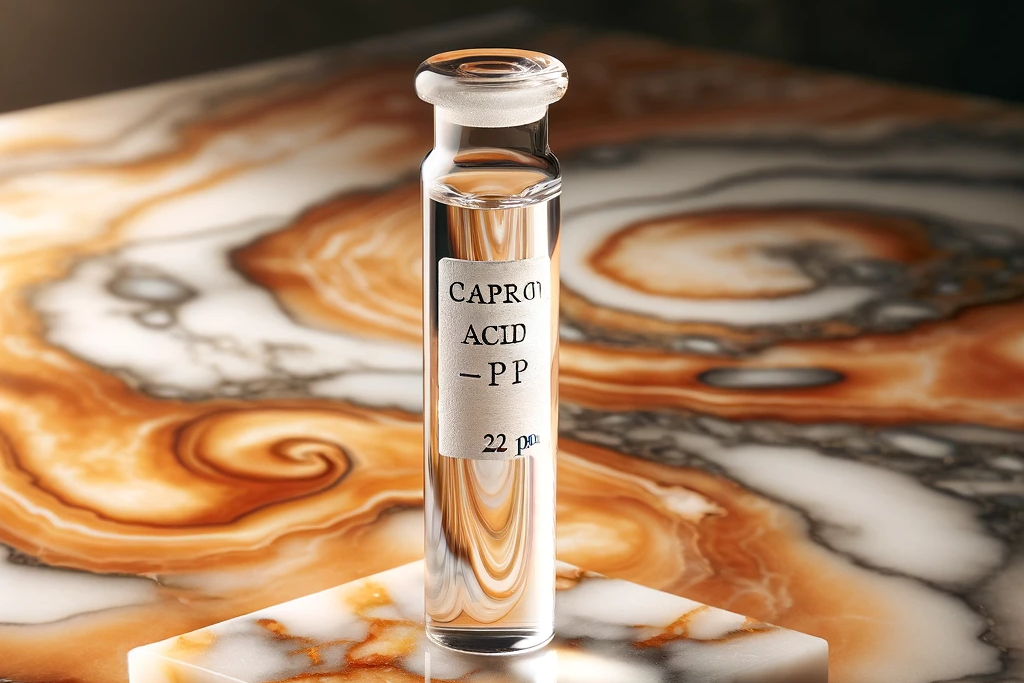Caprylic acid

Caprylic acid is a medium-chain fatty acid found in some vegetable oils such as coconut oil or palm oil. It has various effects on the dog's body and can have both advantages and disadvantages. In this article, you'll find out what caprylic acid is, how it works and when you should give it to your dog.
What is caprylic acid?
Caprylic acid is a saturated fatty acid with eight carbon atoms in its structure. It belongs to the so-called medium-chain triglycerides (MCTs), which differ from the long-chain triglycerides (LCTs) found in most animal fats. MCTs are metabolized faster than LCTs and provide the body with energy quickly. They are primarily broken down in the liver and can promote the formation of ketone bodies, which provide an alternative source of energy for the brain.
How does caprylic acid affect dogs?
Caprylic acid has various effects on the organism of dogs, which can vary depending on the dose and application. Here are some of the most important effects:
- Antimicrobial effect: caprylic acid can be effective against some bacteria, viruses and fungi that can cause infections or inflammation. For example, it can help fight yeast infections such as Candida albicans, which can lead to skin problems, itching, ear infections or food intolerances. Caprylic acid can also be effective against some pathogens that cause gastrointestinal infections such as salmonella or Escherichia coli.
- Energy supplier: Caprylic acid can provide the body with energy quickly without raising blood sugar levels. It can therefore be helpful in dogs with diabetes or obesity to regulate metabolism and promote fat burning. Caprylic acid can also improve energy supply to the brain by stimulating the formation of ketone bodies. This can be useful in dogs with epilepsy or cognitive disorders such as dementia to improve seizure frequency or memory performance.
- Immunomodulatory effect: Caprylic acid can influence the immune system of dogs by modulating the activity of certain cells or messenger substances. For example, it can reduce the production of pro-inflammatory cytokines such as interleukin-6 or tumor necrosis factor-alpha and thus inhibit inflammatory reactions. It can also improve the function of T cells or macrophages and thus strengthen the body's defense against infections.
What are the benefits and disadvantages of caprylic acid for dogs?
Caprylic acid can have advantages or disadvantages for dogs depending on the situation. Here are some of the main pros and cons:
Benefits
- Caprylic acid can help prevent or treat infections or inflammation that can lead to skin problems, ear infections, gastrointestinal problems or allergies.
- Caprylic acid can provide the body with energy quickly without raising blood sugar levels. It can therefore be helpful for dogs with diabetes or obesity to regulate the metabolism and promote fat burning.
- Caprylic acid can improve energy supply to the brain by stimulating the formation of ketone bodies. This can be useful in dogs with epilepsy or cognitive disorders such as dementia to improve seizure frequency or memory performance.
- Caprylic acid can influence the immune system of dogs by modulating the activity of certain cells or messenger substances. For example, it can inhibit inflammatory reactions or strengthen the defense against infections.
Disadvantages
- Caprylic acid can lead to digestive problems such as diarrhea, vomiting, flatulence or abdominal pain if the dosage is too high or if it is introduced too quickly. It can also alter the intestinal flora and thus impair digestion or the immune system.
- Caprylic acid can cause allergic reactions such as skin rashes, itching, swelling or breathing difficulties in some dogs. It can also aggravate existing allergies or trigger new ones.
- Caprylic acid can lead to behavioral changes such as restlessness, aggression, anxiety or depression in some dogs. It can also influence the effect of certain medications such as antiepileptics, antidiabetics or anticoagulants.
How and when should caprylic acid for dogs be used?
Caprylic acid for dogs is available in various forms, for example as oil, capsules or powder. The dosage depends on various factors, such as the dog's weight, health status, goal and tolerance. A general recommendation is to start with a low dose and slowly increase it until the desired effect is achieved. A possible dosage is, for example, 1 to 2 ml per 2.5 kg body weight per day. Caprylic acid is best given together with food to facilitate digestion.
Caprylic acid for dogs should only be used after consultation with a veterinarian to rule out possible risks or interactions. It should not be used in dogs with a known allergy to caprylic acid or coconut oil. It should also not be used in dogs with liver or kidney disease, pancreatitis, stomach ulcers or blood clotting disorders. It should also not be used in pregnant or lactating bitches.
Caprylic acid is a medium-chain fatty acid found in some vegetable oils such as coconut oil or palm oil. It has various effects on the organism of dogs and can have both advantages and disadvantages. For example, it can help to prevent or treat infections or inflammation, provide the body with energy quickly, improve the energy supply to the brain or influence the immune system. However, it can also lead to digestive problems, allergic reactions, behavioral changes or interactions with medications. Caprylic acid for dogs should therefore only be used after consultation with a veterinarian and administered in an appropriate dosage and form.
If you notice any signs of hypersensitivity or poisoning in your dog, you should see your vet immediately. We are not a substitute for a vet, but we try to be as accurate as possible. Every dog reacts differently and we recommend you get a second opinion or consult your vet if in doubt.
Stay healthy and take good care of your four-legged friend!😊
Similar to Caprylic acid
Caproic acid occurs chemically bound in milk fat triglycerides in milk and also in coconut oil. It is also found esterified in various seed oils and essential oils; spruce needle oil, lavender oil,...
Capric acid has several positive effects on the health and well-being of dogs. Here are some of them: Capric acid promotes energy supply to the brain. As capric acid is preferentially oxidized in...
Lauric acid is a medium-chain fatty acid (MCFA) found mainly in coconut oil and to a lesser extent in palm kernel oil and the milk of some mammals. This particular fatty acid has attracted the...
Palmitic acid is an organic acid with the chemical formula C16H32O2. It is a saturated fatty acid, i.e. it has no double bonds between the carbon atoms. Palmitic acid is a colorless solid at room...



